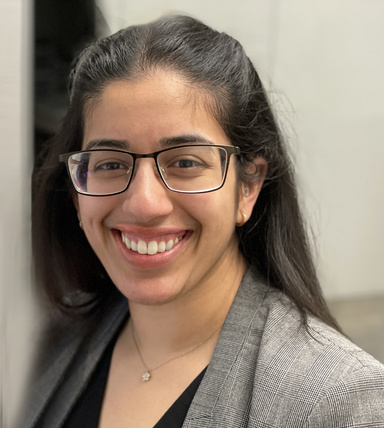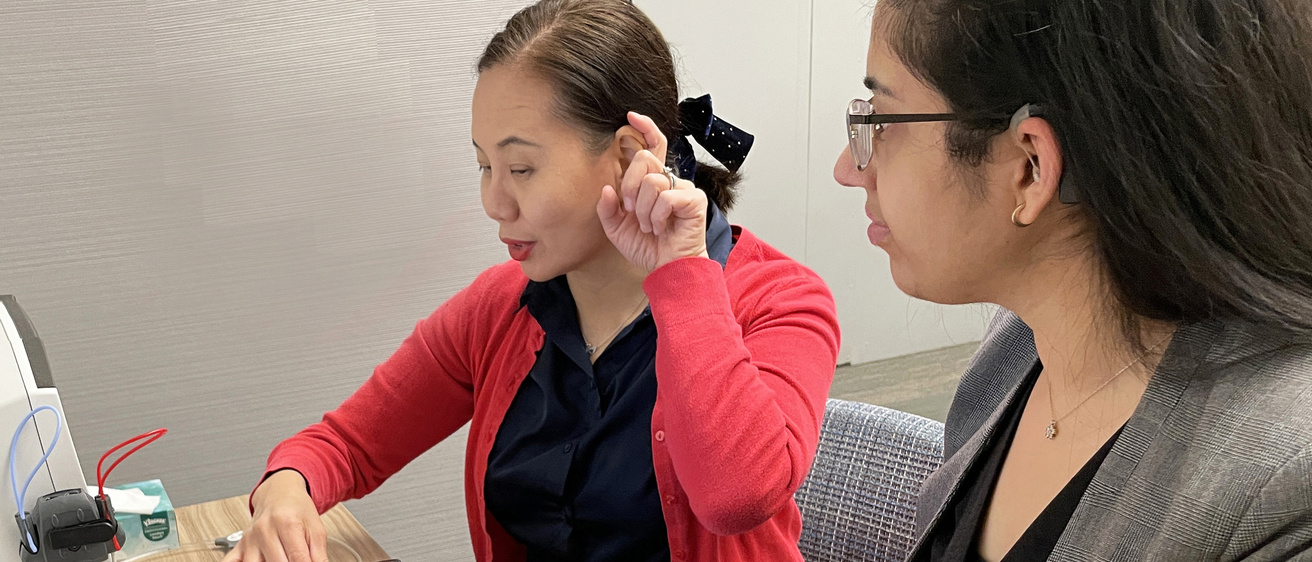Priyanka Gupte is set to hone her audiology skills in the clinic where she received her own cochlear implants
Story & photos: Julie Ostrem

When she was five years old, Priyanka Gupte received her first cochlear implant at Lurie Children’s Hospital. Fast forward a couple of decades, and she’s returning to Chicago to become a provider in the same audiology clinic, caring for pediatric patients with hearing loss.
Gupte, in her third year of the #2 ranked University of Iowa Doctor of Audiology program, begins her externship in the summer, working alongside clinical audiologists treating patients and counseling their families.
“It will be exciting to return to my roots and the personal connection I have with the Cochlear Implant Program at Ann & Robert H. Lurie Children’s Hospital,” she said.
Gupte was diagnosed with bilateral severe to profound sensorineural hearing loss just before her second birthday. After initially wearing hearing aids, she was fitted with a CI in her left ear and received a second CI in her right ear several years later.
“Initially, my right ear was not a candidate for the CI, as I was still getting benefit from my hearing aid. However, my hearing loss was progressive, and ultimately my residual hearing was gone,” she said. “The surgeon who first operated on me agreed it was time for the second surgery to happen.”
Living with hearing aids -- and later CIs -- pointed her to a communication sciences and disorders undergraduate major at New York University. While she initially leaned toward a career as a speech-language pathologist, an influential NYU professor encouraged her to consider audiology.
The paradigm shift from audiology patient to audiology provider was impactful, Gupte said, as was the care she received from the CI audiologist at Lurie Children’s Hospital, a clinician she calls not only an advocate, but a role model.
“(As a patient) she always kept me up to date on CI technology, but what I really appreciated was how she listened to me. She knew my parents had their own opinions, but she put my opinions first as I got older. She helped teach me how to maintain my CIs and urged me to be honest about my hearing.” she said. “I must credit this audiologist for being so supportive and incredible in her care.”
As a future audiologist, Gupte knows her own journey with hearing loss helps her relate to clients she treats at Iowa’s Wendell Johnson Speech and Hearing Clinic, the training clinic within Iowa's Department of Communication Sciences and Disorders (CSD). ”Patients appreciate hearing stories similar to what they face, which an audiologist with a hearing loss can tell them,” she said.
Her mentors agree.
“Our pediatric patients with cochlear implants are delighted to encounter Priyanka, a clinician who wears devices just like them,” said Julie Jeon, PhD, Clinical Assistant Professor in CSD. “Their faces light up as they point to Priyanka’s sound processors, excited to share this connection with their parents.”
Within the audiology profession, Gupte is among the minority of clinicians with a hearing loss, and that brings inevitable challenges. Most testing equipment and protocols were developed with an assumption that the audiologist can use normal hearing. For example, listening checks on patients’ hearing aids usually require a special stethoscope, which didn’t work well with Gupte’s CIs.
However, she did not face these difficulties alone and is quick to credit the clinical faculty in CSD for troubleshooting and cheering her on.
“My supervisors at Wendell Johnson were so helpful. They reached out to Iowa’s former audiology students with hearing loss to find out what has worked for them. Using their experiences, I figured out what would work for me. Having a supportive team of clinical instructors really helped me grow my confidence as a clinician,” she said.
As her teacher, Jeon believes any effort spent in clinical trouble-shooting is far outweighed by Gupte’s role in creating an environment where others can be authentically themselves.
“Priyanka's unique perspective as an audiologist with a cochlear implant has truly enriched our cultural competence within the healthcare sector, fostering a more inclusive environment for all individuals seeking care,” she said.
“Leveraging the expertise of audiologists with personal experience of cochlear implants can lead to a more inclusive and culturally sensitive approach to patient care, ultimately fostering a more equitable healthcare landscape for all.”
